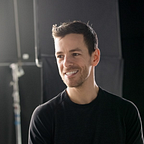The question I asked every person looking for a social media job
I’ve got a lot of respect for people who prepare for interviews. Those that do the research, practice talking about their experience, and come ready with a page full of questions. It means they really want it.
But being prepared is just as important as thinking on your feet. And I made sure to test that with every applicant we interviewed in person.
I’ve been in content marketing since 2010 and I’ve met hundreds of people looking for their next sweet social media gig. I’ve hired for roles like community manager, content strategy, social analytics experts, and copywriter.
Every interview, we’d start with the standards — tell me about your experience, why do you want this position, why are you leaving your current position. Then I’d ask them situational questions, like tell me about a hard decision you had to make, and what does a bad day at work look like for you?
Towards the end, I’d test the quick wit.
“OK. I’m your consumer brand client, and I want to put all my social media money into just one social network for the next 10 years. Which one will you recommend to me, and why?”
I asked this question to applicants in 2012. Then again in 2013. And then more recently in 2016 and late 2017.
The most common answer was…usually a bit of stunned silence, followed by the classic stalling technique of “Oh that’s a good question!” .
And then…
“Twitter”
Yeah. Twitter. Like, 90% of the time.
Which is hilarious because Twitter was (and is) the one social network with no definite present or future. They famously failed to get acquired in 2016, and Jack Dorsey’s often admitted to being unsure what to do with their stagnating user growth.
It’s also hilarious because if you ask your friends about Twitter, a lot of them will say they don’t “get” it, have never been on it, or once created an account but never went back.
So why did my applicants say Twitter? Their reasons varied:
- Real-Time Information: As far back as 2012 and even before, news was broken on Twitter, either by publications or newsmakers themselves (athletes, politicians, etc.). Many applicants felt this trend would last a long time, and I still don’t disagree with them. How often does a news station quote twitter these days?
- Critical mass: Remember the Arab Spring? Twitter played a huge role there, helping people to mobilize and share information with journalists in real time. It allowed protesters to mass and move as a whole with just a quick glance of their phone. With inequality and corruption in the news, applicants felt Twitter still had a role to play.
- No future Facebook: As far back as 2012 and as recently as 2017, applicants were doubting Facebook’s long-term value and success. This year hasn’t been kind to the social network, so maybe they were onto something.
- Trump: This might seem obvious. But at the end of the day, Donald Trump doesn’t have to tweet, he chooses to tweet. And there is no bigger Twitter handle than his. Free advice for his 2020 opposition: learn to use Twitter, and learn to make it count. You won’t win this one with SNL appearances.
I do love Twitter, both as a tweeter and a lurker. I’m not sure what its future holds, and I’m not sure how I would answer my own interview question. In fact, I think many of us “content strategists” are more uncertain than ever about what’s going to happen next in our decade-old industry.
So it doesn’t hurt to ask each other.
Luc Doucet is a content strategist and executive producer in Vancouver, BC. He has been in content marketing space for over 10 years and has worked with brands like GMC, SaskTel, Bacardi, Molson Coors, Lavazza, Ford, and Accor Hotels (motel 6).
